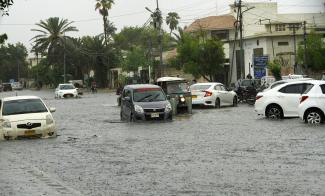SDGs
No reason to sit back and relax

The Sustainable Development Report 2020, written by Jeffrey Sachs and a team of experts from the Sustainable Development Solutions Network (SDSN) and Bertelsmann Stiftung, was published at the end of June. It provides an overview of the world’s implementation efforts concerning the Sustainable Development Goals (SDGs). The report also takes into account how Covid-19 has disrupted the SDG process. The poorest people are most affected, particularly women and children, elderly and disabled people, migrants and refugees.
Goal 13 on climate action is the only target Pakistan has met this year. Government, civil society and environmentally conscious people are jubilant about this achievement. However it is important to understand that it does not mean that Pakistan is not vulnerable to climate change anymore. Extreme weather events as well as slow onset events continue to take their toll. Nor does the good result mean that Pakistan has done enough to fight climate change.
Guillaume Lafortune, the SDG index manager at SDSN and coordinator of the report, says: “In our methodology, Pakistan has achieved the climate action goal, as its energy-related emissions are below two tons per capita.” The trend is upward however. Lafortune warns that, if it continues, “Pakistan won’t be able to stay within this ‘green zone’. He urges the country to remain vigilant and decouple economic growth from negative environmental impacts.
Lafortune also draws attention to the fact that Pakistan is lagging behind in achieving SDG 7 on affordable and clean energy. He urges the government to stop investing any further in coal-fired power plants. Moreover, it should discontinue subsidies for fossil fuel companies. Lafortune wants the government to “pursue efforts to provide universal access to clean energy”.
Adil Najam of Boston University agrees that achievement of SDG 13 is no reason to sit back and relax. He views the SDG targets as milestones, not final goals: “They are the minimum targets that every country has to meet and then work to exceed.” Najam considers it particularly important to reduce carbon emissions by increasing the share of renewable energy in the national grid and boosting energy efficiency. From his point of view, the government should shelve all fossil fuel projects that are currently in the pipeline.
Najam stresses that Pakistan meeting the climate-action goal hardly makes a difference at the global level. The country accounts for less than one percent of global emissions. “To make a real impact, the major carbon polluters – particularly the United States, China, India and other developed nations – must bring down their emissions,” he says.
Malik Amin Aslam Khan is an adviser to Prime Minister Imran Khan on climate change. He says that Pakistan is “willing to take actions which can reduce carbon emissions for itself as well as the world”, though Pakistan is not a major emitter. In this sense, the achievement of SDG 13 “just reinforces our role as a responsible global state”. Khan says that the government has opted for hydropower projects to replace two coal-fired power projects that would have relied on imported coal and were approved for funding under the China-Pakistan Economic Corridor (CPEC).
Khan confirms Pakistan’s high vulnerability to climate change. “We have to continue taking action to adapt to the changing climate,” he says. Relevant issues include glacial lake outbursts (see my essay in Focus section of D+C/E+Z e-Paper 2020/06), better flood forecasting, vulnerability mapping, early warning systems and climate-smart agriculture.
The Sustainable Development Report 2020 encourages Pakistan to proceed in the right direction. It is not an excuse to stop fighting climate change. The government must act swiftly to protect its people.
Source
Sachs, J., et al., 2020: The Sustainable Development Goals and COVID-19. Sustainable Development Report 2020. Cambridge University Press.
https://www.sdgindex.org/
Syed Muhammad Abubakar is an environmental journalist based in Pakistan.
s.m.abubakar@hotmail.com
Twitter: @SyedMAbubakar







